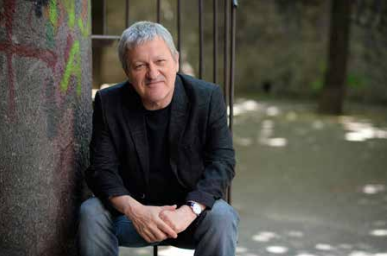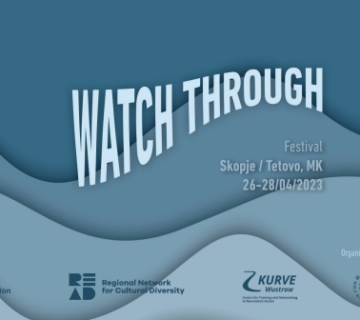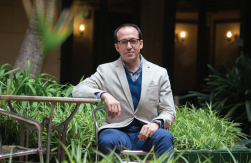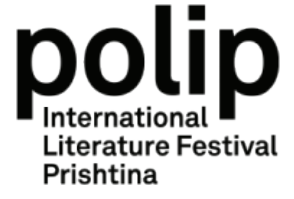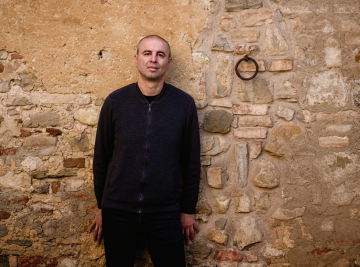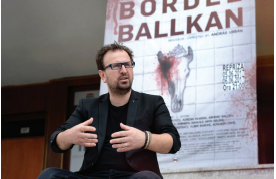Dragan Velikic is one of the most well known Serbian contemporary writers. His novels have been translated in fifteen languages. In
2007, he won the most prestigious award in his country, the NIN award for the best novel of the year, and years later, in 2015, he
would be recognized again with the same award for the novel The Investigator, which would also become in the most requested book
in Serbian libraries in 2016. We are publishing the beginning of one of the chapters from this novel.

There were always lots of words in our house. An overabundance of words and sentences. Whole paragraphs that once belonged to someone somewhere. Fallen from the frontage of someone else’s life. My mother would shower whomever she was talking to with words. She was a collector of hundreds of replies – that is how she remembered who had said them.
“Nothing happens by chance. Even something bad can lead to something good. Lizeta was right when she said: when one door closes, a window opens.”
She would stop for a second, as if searching her mind for that opening window. I can see her walking around the flat, and later in the corridors of the old people’s home, looking for a sentence that would make her happy, that would always make her see the bright side. She never allowed herself to become despondent. She was convinced that weakness harboured all sorts of evils.
During her brief quarrels with my father – he was usually her punching ball – she would come out with the most incredible arguments and always had a ready answer. An actress who was just waiting for a propitious opportunity to use a monologue from a play that had long since been taken off the repertoire.
I’m sitting with my sister at a little table, each of us with a picture book, each of us still. Porcelain figures. That’s how we look in most of the photographs dating from those times.
“How can you be so distracted? Don’t you see anything at all?” my mother says. “Me, as soon as I come somewhere, I need no more than a second to take stock of the situation, of people’s habits. Everybody would want somebody like me as a guest.”
“Only as a guest,” my father observes ironically.
“Aren’t we witty!” my mother says, launching into a tirade. The reasons were always banal: a glass left without a coaster on a polished table, a cigarette butt left burning in an ashtray, suds on the rim of the sink.
She was annoyed by any kind of trace. A witness to a presence. You had to silently step away from where you’d been. She was the cleaner of traces. An Indian warrior who marched in the middle of the stream to cover up her own traces. She liked going to the cemetery: that was where life was finally buried. Graves aroused a hidden joy in her, an awareness of the triumph of order over the confusion of life. Birth and death certificates were the only reliable testimonies. Everything in between – one’s life on earth – was nothing but great suffering which could be endured by constantly deferring it. My mother lived a deferred life. Which is why she never carried out a single plan, be it a trip to California, a visit to her best friend from her youth, or filling the photo albums that lay in the wardrobe, still in their cellophane wrapping, alongside a dozen boxes crammed with photographs.
My mother was a past master at postponement. A prisoner of rituals. Twice a year, for New Year and before summer, she would open the trunk containing the new toys that, along with clothes, regularly arrived in huge packages from California. They were little family celebrations during which my sister and I would receive a few toys. We were eager to see what else was hidden in the trunk. However, my mother believed that the best way to develop a sense of values in children was to show them that they couldn’t have everything they wanted. There always had to be something they couldn’t have.
Slow to make big decisions, she was quick to fulfil her daily duties. The two clashed. Unless her zeal in everyday matters was merely an alibi for her lack of resourcefulness in life? The thousands of photographs kept in the boxes were convincing proof that life had, after all, been lived to the full. Smiling faces and embraces testified to a full life, one of pleasures and joy.
Whenever we arrived in a town, my mother would remind my sister and me of some distant relatives who were no longer alive. That was an excuse to go to the cemetery. There we were free. She would let as roam among the grave sites. We would stop in front of family tombs, admire the marble, stone and plaster statues and the gorgeous wrought-iron railings.
“What a family!” she would say to herself. “Who says there is no such thing as eternity?”
My sister and I would gaze at the porcelain photographs. We amused ourselves by reading the unusual names, looking for who was oldest. We competed to see which of us would be the first to find someone who was a hundred years old. But when we came to the graves of children, we did not stop, we would walk past them in silence.
At the cemetery, my mother was relaxed, free of the tension that kept her slight body constantly trembling. A constantly running engine.
I remember the cemetery in Varaždin, the tall cypress trees and the flowering magnolias, the geometrically shaped boxwood, the statues of angels.
“Like in Versailles,” my mother would sigh.
When we went to Rijeka, to visit my father on the ship, we always went to the cemetery in Trsat. For a long time, I thought that we had relatives buried there. In Split, we walked every day on the southern side of Marjan, all the way to the cemetery in Sustipan. A few years later, the cemetery was gone. They told us it had been moved outside the city.
“Terrible,” my mother said with a shiver, “to be buried twice”.
Translated by Christina Pribichevich Zorich

